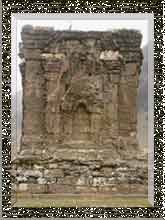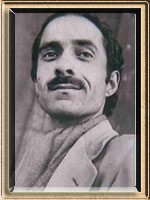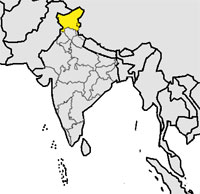Kasmiri Language

 Introduction
IntroductionKashmiri language, popularly known as "Koshur", is spoken primarily in the Kashmir Valley of the Indian state of Jammu and Kashmir. India has about 5 million plus people speaking this language in and around Kashmir. Those Kashmiri speaking people living in Pakistan are mostly immigrants from the Kashmir Valley. Kashmiri is one among the 22 scheduled languages of Indian constitution and is also the official and administrative language of the state of Jammu and Kashmir.
Since November 2008, the Kashmiri language has been made a compulsory subject in all schools in the Valley up to the secondary level. Origin of Kashmiri language shows a number of different influences. The complex dynamics of language development in a multi-lingual State like Jammu and Kashmir is definitely a difficult task to carry out and to pinpoint a definite origin to the language. This has lead to endless arguments and counter arguments amongst the scholars of this field of study.
 In accordance with the geographical linguistic connections, the Indo-European Languages have been divided into several sub-groups and Kashimiri basically belongs to one of the sub-groups known as Dardi. While the Dardi was prevalent in the region, Sanskrit language made inroads as it did into the other North Indian languages and in course of time the dominance of Dardi language slowly faded away. And because of this fact Kashmiri was thought of as a language that branched off from Indo-Aryan Sanskrit. From about the 14th century, medieval Persian too started creeping into Kashmiri and such foreign influences have left some peculiarities with the language in terms of certain vowel and consonant sounds which no other Indian language has.Kashmiri used "Perso-arabic script" and "devanagari script" during different periods of time. However in modern period, Kashmiri is continued to be written in both the scripts with some modifications.
In accordance with the geographical linguistic connections, the Indo-European Languages have been divided into several sub-groups and Kashimiri basically belongs to one of the sub-groups known as Dardi. While the Dardi was prevalent in the region, Sanskrit language made inroads as it did into the other North Indian languages and in course of time the dominance of Dardi language slowly faded away. And because of this fact Kashmiri was thought of as a language that branched off from Indo-Aryan Sanskrit. From about the 14th century, medieval Persian too started creeping into Kashmiri and such foreign influences have left some peculiarities with the language in terms of certain vowel and consonant sounds which no other Indian language has.Kashmiri used "Perso-arabic script" and "devanagari script" during different periods of time. However in modern period, Kashmiri is continued to be written in both the scripts with some modifications.  Literature
Literature It is said that Kashmiri is the only Dardic Language with a literature. Kashmiri literature too has originated more than seven hundred and fifty years ago. Though the Kashmiri language is so antique, the Kashmiri literature falls in the genre of Modern literature. The earliest use of Kashmiri in literature is found in Kalhana's Rajatarangini (12th century AD) in which a three-word phrase of Kashmiri Apabhramsa is used. However, the earliest composition in Kashmiri appears to be the Mahanayaprakasa of Sitikantha Acharya, which belongs to the period 1200-1500 AD. Another work of unknown date called Chumma- sampradaya also provides the oldest specimen of Kashmiri literature. Contrary to what happened in other literatures, from the evidences available now, the first great Kashmiri literary writer was a 14th century Saiva woman-saint Lalla Didi, who has written many compositions in Kashmiri which are still very popular. She was fondly known as Lal Dad or Granny Lal. Her sensitivity and mysticism in the verses "Vaakh" were celebrated by all like the Hindus, Muslims, scholars and peasants.
The Shrukhs of Sheikh Noor-ud-din, Mahanay Prakash of Shiti Kantha, Banasura Katha of Bhatavatar and Sukhadukhacharitam of Ganaka Prashasta are the other works emerged till 1555 AD; but they did not receive much recognition. The sayings or shrukhs of another mystic poet Sheikh Nuruddin (1377-1440 AD) have been compiled in the book Nurnama or Rshinama. Utthasoma, Yodhabhatta and Bhatta Avatara were the important Kashmiri poets in the court of Zainul Abidin (1420-1470 AD). Utthasoma's treatise on music called Manaka, Yodhabhatta's Jainacharita and Jainaprakasa and Avatara's Jainavilasa were important works of this period. Banasuravadha is considered as the earliest epic poem in Kashmiri.
During 1500-1800 AD, Kashmiri literature witnessed a mighty development. Hubba Khatun (1551-1606 AD) was a very remarkable poetess, whose lyrics on love and romance called lol still captivate the Kashmiri people. Rupabhavani and Aranimal were other great poetesses of Kashmir. Sahib Kaul, a Hindu poet who lived during the time of Jehangir, wrote Krishnaavatara and Jananmcharita. The Ramavataracharita by Prakasarama, as its name suggests, is the epic of Lord Rama adapted from Ramayana, which was later followed by his Lavakusacharita. Mir Abdullah Baihaqi's Koshir-Aqaid and Mukhtasar Waqayah also belong to this period, when many Persian works like Laila-Majnu and Shirin-Khusro were adapted in Kashmiri. Along with the mystical and esoteric verses perfected by Habib Ullah Navshohri and Rupa Bhawani, a new kind of love poetry developed. This was the beautiful lol-lyric, sung mostly by women. Habba Khatoon and Aarnimal were the ruling ladies of this genre.
Translation of Persian literary works into Kashmiri by poets like Mahmud Gani and Waliullah Motoo (both mid-19th century) were done and masnavis (couplets expressing one emotion) and ghazals (romantic poetry set to music) were created and received with big appreciation. The legendary love tales of Laila and Majnu, Shirin and Farhad, Sohrab and Rustum, and many more belong to this period.Lila-poetry was another innovation. Paramanand (1791-1885) excelled in this kind of work. Prakash Ram, Maqbul Shah, Lachman Raina, Rasul Mir and Shams Faqir composed poetry in other forms. Songs and ghazals have always been a part of their literary culture. In the first few decades of the 20th century, creative marvels of mystical and secular poetry, ghazals, masnavis and Geets were written.
In the period after 1800 AD, apart from Sanskrit and Persian, Urdu and English started influencing Kashmiri. This paved way for new ideas and styles in the Kashmiri literature. Mahmud Gami, Maqbul Shah, Paramanand and Wahhab Pare were some of the early poets of this period. Paramanand wrote many narrative poems like Radhaswaymvara, Sudamacharita and Sivalagan based on Sanskrit Puranas. Abdul Wahab Pare (1845-1913) adapted Firdausi's Shahnama into Kashmiri and also translated the Akbarnama. Another competent poet of the same period was Lakshman Ju who authored Nala-Damayanti and a number of ghazals and short poems in Kashmiri. The Sikandarnama of the 12th century poet Nizami was translated into Kashmiri by Maulavi Siddiqullah. It is worth mentioning here that K.F.Burkhard and G.A.Grierson were the two European scholars who promoted Kashmiri literature during this period.
 The other important works of this period include Krishna Razdan's Sivaparinaya;Dinanath's Krishnavataralila; Waliullah Mattu's Himal Ta Nagaraya, Azizullah Haqqani's Gazliyat-i-Haqqani and Ramzan Bath's Akhnandana. Pirzada Ghulam Ahmad Mahjur (1885-1952) was one of the earliest nationalistic poets of Kashmir who wrote several lyrical and patriotic poems with political themes. Nandalal Kaul was a famous poet and dramatist of Kashmiri. He wrote noteworthy dramas like Satach Kahwath, Ramun Raj, Dayalal and Prahlada Bhagat. Pandit Narayan Khar rendered Bhagwad Gita into Kashmiri and this was a landmark in Kashmiri literature. Important Kashmiri poets of the post-Independence period include Abdul Ahmad Azad, Dinanath Nadim, Amin Kamil, Ghulam Rasul Nazki, Rahman Rahi, Abdul Haqq Barq and Nur Mohammed Roshan.
The other important works of this period include Krishna Razdan's Sivaparinaya;Dinanath's Krishnavataralila; Waliullah Mattu's Himal Ta Nagaraya, Azizullah Haqqani's Gazliyat-i-Haqqani and Ramzan Bath's Akhnandana. Pirzada Ghulam Ahmad Mahjur (1885-1952) was one of the earliest nationalistic poets of Kashmir who wrote several lyrical and patriotic poems with political themes. Nandalal Kaul was a famous poet and dramatist of Kashmiri. He wrote noteworthy dramas like Satach Kahwath, Ramun Raj, Dayalal and Prahlada Bhagat. Pandit Narayan Khar rendered Bhagwad Gita into Kashmiri and this was a landmark in Kashmiri literature. Important Kashmiri poets of the post-Independence period include Abdul Ahmad Azad, Dinanath Nadim, Amin Kamil, Ghulam Rasul Nazki, Rahman Rahi, Abdul Haqq Barq and Nur Mohammed Roshan. Dinanath Nadim's poems like Yirada, Ba Gyavna Az and Zindabad Shyamji brought new vigour into Kashmiri verse. He also wrote an opera called Bambur Yambarzal in 1953, which won the Sahitya Akademi Award in 1967. Nadim along with Roshan produced another opera, Himal ta Nagaraya in 1956. Rahman Rahi is also a recipient of the Sahitya Akademi Award (1962) for his Nauroz-i-Saba. Another writer, Akthar Mahiuddin also won the Sahitya Akademi Award in 1958 for his collection of short stories Sathsangar. He also has two novels, Dod Dag and Zuv ta Zolana, to his credit and another collection of poems called Swanzal. Motilal Kemmu is a renowned dramatist who wrote powerful plays like Trunov,Mangay and Manjuli Nika.
Dinanath Nadim's poems like Yirada, Ba Gyavna Az and Zindabad Shyamji brought new vigour into Kashmiri verse. He also wrote an opera called Bambur Yambarzal in 1953, which won the Sahitya Akademi Award in 1967. Nadim along with Roshan produced another opera, Himal ta Nagaraya in 1956. Rahman Rahi is also a recipient of the Sahitya Akademi Award (1962) for his Nauroz-i-Saba. Another writer, Akthar Mahiuddin also won the Sahitya Akademi Award in 1958 for his collection of short stories Sathsangar. He also has two novels, Dod Dag and Zuv ta Zolana, to his credit and another collection of poems called Swanzal. Motilal Kemmu is a renowned dramatist who wrote powerful plays like Trunov,Mangay and Manjuli Nika. Prose appeared pretty late in Kashmiri, only in the beginning of the 20th century. There's really not much good Kashmiri prose, except for a few translations. It was also the time of great socio- political movements all over the country, which had their impact on modern poets like Ghulam Ahmed Mahjoor (1885-1952), Zinda Kaul and Abdul Ahad Azad. Like Kashmiri prose, there are only a few noteworthy dramas like Somnath Zutshi's Mordur Mas and Viji Vaav, and some from the Machaama series of Pushkar Bhan.


